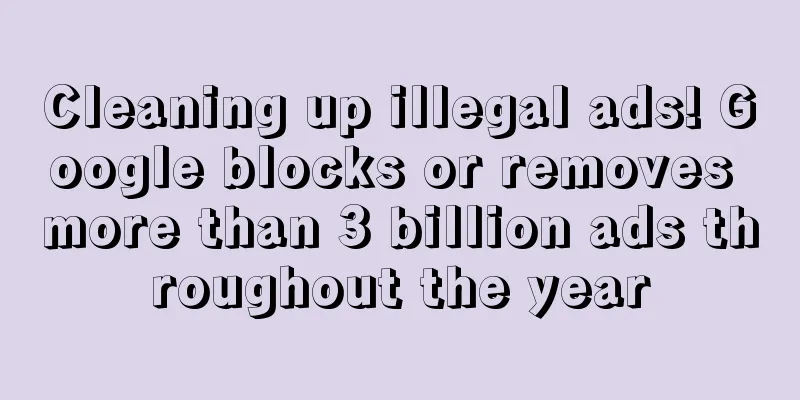Cleaning up illegal ads! Google blocks or removes more than 3 billion ads throughout the year

|
Recently, Google revealed in its annual ad safety report that it blocked or removed about 3.1 billion ads last year . Among them, about 867 million ads were blocked or removed due to abuse of the ad network , and 91 million ads were removed for violating legal requirements . Google also blocked more than 99 million COVID-19 - related ads throughout the year , including ads for miracle cures , N95 masks , fake vaccine reagents, and more.
In addition, Google restricted 6.4 billion ads last year that were deemed "legally or culturally sensitive . " 550 million restricted ads violated legal requirements related to regulated industries, including 80 million ads placed by alcohol brands. These restricted ads are not removed from the platform but are “only allowed on a limited basis.” In the words of Scott Spencer, VP of Ads Privacy and Safety : “Limiting ads allows us to tailor our approach based on geography, local laws, and our certification program so that approved ads are only shown where appropriate, regulated, and legal.” In terms of content moderation, Google added or updated 40 policies for advertisers and publishers in 2020 and removed ads from 1.3 billion publisher web pages, up from only 21 million in 2019 . Google has also cracked down on fraud and introduced an advertiser identity verification program and a business operations verification program to detect promotion of non-existent businesses, fraudulent ads, etc. With the support of these new policies, the number of ad accounts suspended for policy violations increased from 1 million to 1.7 million last year . Of the approximately 3.1 billion ads blocked or removed , 101 million of them were due to violations of Google's misrepresentation policy. Not only Google, but major platforms are also actively controlling false information on their platforms, such as Facebook. Facebook said recently that it shut down 1.3 billion fake accounts between October and December and had more than 35,000 staff members to deal with misinformation on the platform . The company also said in a blog post that it removed more than 12 million pieces of content related to COVID-19 and vaccines that had been flagged as misinformation by global health experts. In summary, sellers need to pay attention to the fact that they must comply with platform policies when placing advertisements, and they should also be cautious when placing advertisements involving sensitive topics. advertise |
<<: The annual revenue of American furniture brands fell by 13%. Here are the reasons
>>: eBay Announcement: Important Updates to SpeedPAK Logistics Management Policy
Recommend
What is the Early Reviewer Program? Early Reviewer Program Review, Features
The Early Reviewer Program is a program designed ...
What is Snapsheet? Snapsheet Review, Features
Snapsheet is a startup that helps people instantl...
Another big seller was blocked, Amazon has banned nearly 300 accounts
Amazon's cleanup has not stopped. Yesterday, ...
Amazon announces fourth quarter 2020 financial results, UPS 2020 revenue $84.628 billion
Amazon announces fourth quarter 2020 financial re...
Niche categories are booming! Industry belt sellers discover new business opportunities in Southeast Asia
Data shows that in 2023, the GMV generated by Tik...
What is Logsta Connector? Logsta Connector Review, Features
Logsta Connector's scalable fulfillment soluti...
What is Nisolo? Nisolo Review, Features
Nisolo is an American leather shoe and accessorie...
What is talkingtables? talkingtables Review, Features
talkingtables is a company that focuses on househo...
Amazon's US employee headcount exceeds 1 million
Recently, Amazon updated the US investment map on...
The seller linked more than 10 accounts in a row, possibly because of payment association!
As the peak season approaches, just as sellers ar...
UK-based Monsoon Accessorize creates a modern online platform
According to foreign media reports, British fashi...
South Korea’s Lightning Pay annual transaction volume exceeds 150 billion won, with an annual growth rate of 67%
Lightning Market’s ( second -hand market) Lightni...
What is Wanqibang? Wanqibang Review, Features
Wanqibang is a global, comprehensive professional...
What is Ptengine? Ptengine Review, Features
Ptengine is a complete marketing and analytics pla...
Multiple stores were closed! Amazon sent out video verification
Video verification is troubling a large number of...









